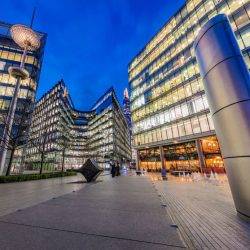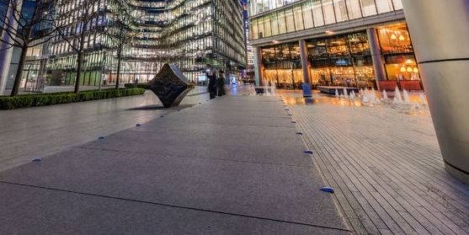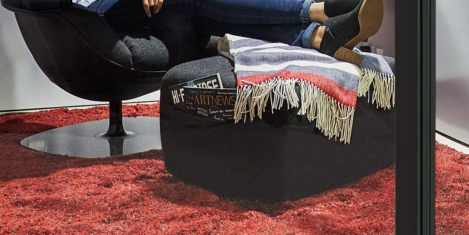October 12, 2018
Search Results for: office of the future
October 10, 2018
The Genesis of ideation and the places we go to have our best ideas 0
by Giuseppe Boscherini • Facilities management, Features, Technology, Work&Place, Workplace design
 Because collaboration, creativity and innovation are increasingly perceived as key objectives and differentiators of performance, the genesis and mechanisms behind ideation and creativity are an an integral part of both business and personal development. As a consequence, there is growing interest in the way the physical attributes of work settings may influence or even trigger creative behaviour. The cliché of the shower as one of these favourite places comes to mind and yet experience does show that the idea of seeking a setting, a “zone” if you will, for a specific purpose is intuitively right. This needn’t be a retreat or cocoon, as is often assumed, but can also be a crowded, busy, noisy place, which might explain why so often the most animated work conversations move out of the office shop into the coffee shop. Equally, highlight events or special meetings tend to be held in a “venue’, often dressed for the occasion.
Because collaboration, creativity and innovation are increasingly perceived as key objectives and differentiators of performance, the genesis and mechanisms behind ideation and creativity are an an integral part of both business and personal development. As a consequence, there is growing interest in the way the physical attributes of work settings may influence or even trigger creative behaviour. The cliché of the shower as one of these favourite places comes to mind and yet experience does show that the idea of seeking a setting, a “zone” if you will, for a specific purpose is intuitively right. This needn’t be a retreat or cocoon, as is often assumed, but can also be a crowded, busy, noisy place, which might explain why so often the most animated work conversations move out of the office shop into the coffee shop. Equally, highlight events or special meetings tend to be held in a “venue’, often dressed for the occasion.
September 27, 2018
A changing world with inbuilt human obsolescence defines first day of CoreNet Global
by Tony Nokling • Facilities management, News, Property, Technology, Workplace design
 The forces that are changing the world, from AI and the current digital and technological transformation, to the short and long-term implications of Brexit, provided many of the key lessons during the first day of the CoreNet Global Summit in Madrid.
The forces that are changing the world, from AI and the current digital and technological transformation, to the short and long-term implications of Brexit, provided many of the key lessons during the first day of the CoreNet Global Summit in Madrid.
September 26, 2018
Sociable Gen Z prefer to work in a communal workplace rather than home
by Sara Bean • Facilities management, Flexible working, News, Workplace, Workplace design
 Generation Z, the latest generation of workers to enter the workplace (aged 18-24) are social creatures a new report suggests, preferring to work in an office environment, with only 8 percent thinking they work best from home compared to 20 percent nationally. However, putting aside the assumption this is because they’re sharing a cramped flat or living with parents, even within the office environment, the vast majority (81 percent) think social and communal areas are important workplace facilities compared with only 64 percent of all employees and 58 percent of Baby Boomers. (more…)
Generation Z, the latest generation of workers to enter the workplace (aged 18-24) are social creatures a new report suggests, preferring to work in an office environment, with only 8 percent thinking they work best from home compared to 20 percent nationally. However, putting aside the assumption this is because they’re sharing a cramped flat or living with parents, even within the office environment, the vast majority (81 percent) think social and communal areas are important workplace facilities compared with only 64 percent of all employees and 58 percent of Baby Boomers. (more…)
September 19, 2018
The main challenge of modern working life: finding the place just right to meet 0
by Jim Ware • Facilities management, Features, Flexible working, Work&Place, Workplace design
 Every physical setting sends distinct signals to meeting participants – signals that set the tone and provide a context for the conversation, even when they are subtle or not in anyone’s conscious awareness. You understand instinctively that the place where a meeting occurs has an impact on the nature of the conversation. Just imagine the difference between a conversation around a large formal conference table with expensive executive chairs and one that takes place in an informal employee lounge, with the participants seated in a circle on soft bean-bag chairs. (more…)
Every physical setting sends distinct signals to meeting participants – signals that set the tone and provide a context for the conversation, even when they are subtle or not in anyone’s conscious awareness. You understand instinctively that the place where a meeting occurs has an impact on the nature of the conversation. Just imagine the difference between a conversation around a large formal conference table with expensive executive chairs and one that takes place in an informal employee lounge, with the participants seated in a circle on soft bean-bag chairs. (more…)
September 19, 2018
RICS announces standards to tackle unfair commercial property service charges
by Sara Bean • Facilities management, Legal news, News, Property

New mandatory requirements that will ensure service charges to commercial tenants are transparent, upfront and fair, and that any costs incurred are in accordance with the terms of the occupational leases, have been announced by RICS. The Institute, which has long called for a fairer and more professional approach to property management to help outlaw “rogue” landlords and managing agents says ‘Service charges in commercial property’ will help regulate the activities of landlords and their agents, whilst protecting tenants from having to pay for unscrupulous repair or maintenance costs. It has worked with major property bodies representing owners, occupiers and managing agents – including BPF, BRC, BCO, PMA, CoreNet, REVO, PMA alongside ICAEW and Law Society, the professional bodies for accountants and lawyers – to produce the recommendations that reflect the needs and opinions of landlords and tenants and the specific considerations of different sectors.
September 18, 2018
Britain should make it easy for high skilled immigrants in the wake of Brexit vote
by Mark Eltringham • News
 The UK Government should restrict levels of immigration by low-skilled workers after Brexit, but at the same time make it considerably easier for for medium-skilled and high-skilled workers from around the world, according to a new report from the Migration Advisory Committee. The detailed report was commissioned in July 2017 by Home Secretary Amber Rudd. Its main conclusion is that there is a great deal of hard evidence of the benefit enjoyed by the UK as a result of the migration of highly-skilled migrants and that future policy should reflect this. The study published today, Tuesday, is expected to have a significant effect on the contents of the government’s immigration white paper, due for publication later this year. The report’s conclusions closely match the policy proposals that Home Office officials have outlined to immigration specialists. However, no special preference would be given to EU citizens in the UK’s future immigration system post-Brexit.
The UK Government should restrict levels of immigration by low-skilled workers after Brexit, but at the same time make it considerably easier for for medium-skilled and high-skilled workers from around the world, according to a new report from the Migration Advisory Committee. The detailed report was commissioned in July 2017 by Home Secretary Amber Rudd. Its main conclusion is that there is a great deal of hard evidence of the benefit enjoyed by the UK as a result of the migration of highly-skilled migrants and that future policy should reflect this. The study published today, Tuesday, is expected to have a significant effect on the contents of the government’s immigration white paper, due for publication later this year. The report’s conclusions closely match the policy proposals that Home Office officials have outlined to immigration specialists. However, no special preference would be given to EU citizens in the UK’s future immigration system post-Brexit.
September 18, 2018
Half of all workplace tasks will be performed by machines within seven years
by Neil Franklin • News, Technology
 The world is going through a workplace revolution that will bring a seismic shift in the way humans work alongside machines and algorithms, according to new research by the World Economic Forum. By 2025 more than half of all current workplace tasks will be performed by machines as opposed to 29 percent today. Such a transformation will have a profound effect on the global labour force, however in terms of overall numbers of new jobs the outlook is positive, with 133 million new jobs expected to be created by 2022 compared to 75 million that will be displaced. The research, published in The Future of Jobs 2018, is an attempt to understand the potential of new technologies to disrupt and create jobs. It is also seeks to provide guidance on how to improve the quality and productivity of the current work being done by humans and how to prepare people for emerging roles.
The world is going through a workplace revolution that will bring a seismic shift in the way humans work alongside machines and algorithms, according to new research by the World Economic Forum. By 2025 more than half of all current workplace tasks will be performed by machines as opposed to 29 percent today. Such a transformation will have a profound effect on the global labour force, however in terms of overall numbers of new jobs the outlook is positive, with 133 million new jobs expected to be created by 2022 compared to 75 million that will be displaced. The research, published in The Future of Jobs 2018, is an attempt to understand the potential of new technologies to disrupt and create jobs. It is also seeks to provide guidance on how to improve the quality and productivity of the current work being done by humans and how to prepare people for emerging roles.
September 18, 2018
Building a culture of creativity that unites the physical and digital workplace
by Serena Borghero • Comment, Technology, Workplace design
 Agreeing on the definition of creativity is no easy task, as it can mean a whole range of different things to different people. To some, creativity means painting a beautiful picture or creating a unique sculpture, while for others it might mean writing a catchy tagline, developing a new business model, or building an innovative online tool. The fact is, creativity can be found in all walks of life, not just those we traditionally see as creative, such as art, design or music. And furthermore, it’s playing an increasingly pivotal role in the growth, development and success of all types of organisations, and the employees working for them.
Agreeing on the definition of creativity is no easy task, as it can mean a whole range of different things to different people. To some, creativity means painting a beautiful picture or creating a unique sculpture, while for others it might mean writing a catchy tagline, developing a new business model, or building an innovative online tool. The fact is, creativity can be found in all walks of life, not just those we traditionally see as creative, such as art, design or music. And furthermore, it’s playing an increasingly pivotal role in the growth, development and success of all types of organisations, and the employees working for them.
September 18, 2018
Employees often too busy keeping up with workloads to innovate
by Sara Bean • AI, News, Technology, Workplace

The majority of workers say their workplace regularly asks them to innovate, but a full 65 percent say they’re so swamped with day-to-day work that they don’t have time to think about the future, a new report by Workfront claims. Yet their work remains important to employees, as over half (57 percent) says what they do matters to them personally. The report also found that UK workers rate their own contributions higher than those of their colleagues. On average, most workers scored their productivity at 7.84/10, compared with 7.05 for co-workers and 6.28 for company leadership. Most do believe though that automation will boost personal productivity, as seventy-seven percent thought that the rise of automation will help people and teams think of work in new and innovative ways. There are concerns too regarding too many time wasting activities, with staff spending only 39 per cent of their workday on their primary tasks. Emails and pointless meetings topped the list of things that keep knowledge workers from getting work done.
September 17, 2018
AI will be commonplace in the working lives of staff very soon
by Neil Franklin • News, Technology
 Experts at Henley Business School have announced that the majority of the graduate workforce in the UK will be working with artificial intelligence on a daily basis by 2030, with technology such as ‘AI assistants’ expected to be commonplace in the next decade. New research released at the Henley annual World of Work 2030 conference, claims that a third (35 percent) of UK workers are excited about the prospect of their own personal AI assistant. With the average worker currently spending 3.5 hours a week on admin tasks, assistants’ could give workers back 12 working days a year (over two working weeks) by taking on these activities and freeing up time for more productive tasks.
Experts at Henley Business School have announced that the majority of the graduate workforce in the UK will be working with artificial intelligence on a daily basis by 2030, with technology such as ‘AI assistants’ expected to be commonplace in the next decade. New research released at the Henley annual World of Work 2030 conference, claims that a third (35 percent) of UK workers are excited about the prospect of their own personal AI assistant. With the average worker currently spending 3.5 hours a week on admin tasks, assistants’ could give workers back 12 working days a year (over two working weeks) by taking on these activities and freeing up time for more productive tasks.

























October 16, 2018
Law firms are finally embracing the agile workplace
by Simon Pole • Comment, Workplace design
(more…)